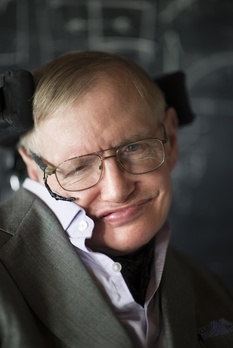Stephen Hawking Dies, After Living 55 Years With ALS

April 18, 2018
Cambridge University theoretical physicist, Stephen Hawking, famous for his theories of the origin of the universe; dies at age 76 on March 14 2018, in Cambridge England. Stephen Hawking died of ALS (amyotrophic lateral sclerosis), after a long battle of 55 years since his diagnosis at age 21.
Stephen William Hawking was born on January 8th 1942, in Oxford England. He attended the same university his father did, the University of Oxford. He intended to study mathematics but as it wasn’t offered, he went on to study physics. Just after three years, he was awarded first class honors degree in natural science. In October 1962, began his research in cosmology at the University of Cambridge, in the Department of Applied Mathematics and Theoretical Physics.
When he was 21 he was diagnosed with ALS disease, a progressive neurodegenerative disease that affects nerve cells in the brain and the spinal cord. The average lifespan for someone with ALS is two to five years after diagnosis. Many can outlive the sentence of five years and more than half the people with ALS live more than three years. Even though he was wheelchair bound, he still had gotten married and had three children and grandchildren.
Hawking was famous for his theory of the beginning of time known as The Big Bang. Hawking’s new mathematical equation made with Roger Penrose had been able to provide a set of ample conditions for the existence of a singularity in space-time and implied that space and time would of began at the Big Bang event, and would end in black holes. Other work he is known for: proving black holes are not completely black (“Hawking’s Radiation”), his work in string theory, his “Theory-of-Everything” and so much more.
As he is one of the sciences most iconic physicist, many wonder why he never won a Nobel Prize. His theory and of the end of the universe through a black hole, while revolutionizing the way we see the universe, is still only theoretical. Theoretical science discoveries require data that provide evidence for the theory before being nominated for a Nobel. Even his most important of findings, “Hawking’s radiation”, does not have the technology to provide evidence.
Even though Hawking never won a Nobel, he still was one of science’s greatest minds in the field of Theoretical Physics. Steven Hawking was a gift to cosmology and will be an inspiration to every generation come after.
RIP Steven Hawking





















